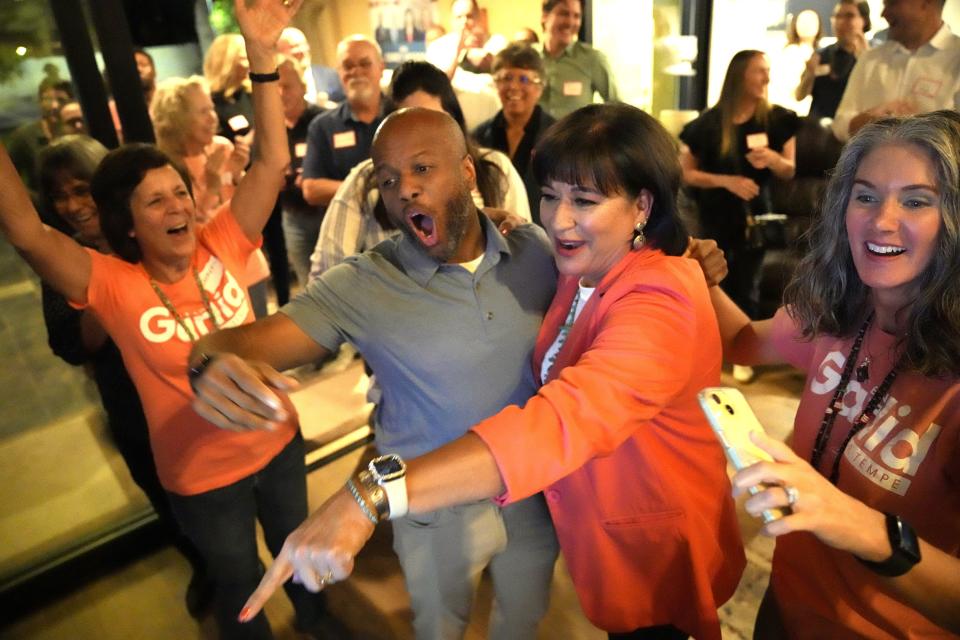Tempe's final election tallies are in. Voters approve status quo candidates, growth plan
The final unofficial results for Tempe’s March 2024 election show that the incumbents and Tempe’s lone pro-development newcomer swept the ticket, while voters also approved a new city growth plan by a landslide.
Maricopa County released the final tally on Saturday. As with all local elections in Arizona, the results will remain unofficial until they’ve been tabulated and canvassed by local officials.
Voter turnout was the second highest during any Tempe candidate election since at least 2014. Roughly 29% of the city’s 84,500 registered voters participated, which is about three percentage points higher than the average turnout during the past five City Council contests.

Tempe Mayor Corey Woods ran unopposed and won a second term with 94% of the votes. He beat out write-in candidates by roughly 18,000 votes overall.
City Council incumbents Doreen Garlid and Randy Keating also secured a second and third term on the council, respectively. Garlid was the top vote-getter with nearly 15,000, while Keating came in second with 13,500.
The third council seat — up for grabs this year — went to public relations consultant Nikki Amberg, a political newcomer who received about 13,000 votes. She was the non-incumbent most closely aligned with the city’s current policy to boost development to combat rising housing prices.
None of those candidates were backed by Tempe 1st, the political organization that successfully campaigned against the Arizona Coyotes’ $2.1 billion project last year.
The group came up short on all fronts this time around, however.
Tempe 1st supported school psychologist Hugo Tapia and former Green Beret David Lucier for council. Both lost their bids by a sizable margin, receiving about 3,000 fewer votes than Amberg. Lucier landed in last place, about 100 votes behind Tapia.
Both losing candidates ran campaigns focused on limiting what they contend is overdevelopment in Tempe that’s encroaching on residential neighborhoods, increasing traffic and making the city less livable.
Tempe 1st made similar arguments in its campaign against the only ballot initiative on this year’s ticket, Proposition 478, which passed with nearly 61% of the vote.
The proposition asked voters to approve a new city growth blueprint called General Plan 2050. It’s a long-term planning strategy that broadly spells out not just how pieces of land can be used but also the community's vision for its transportation network, parks, civic buildings, public art, environmental sustainability and economic development.
The general plan became controversial because it allows for taller and denser buildings in some parts of Tempe.
Opponents of the plan, such as Lucier, raised concerns about overdevelopment, increased traffic, environmental impacts, and what they see as an urban encroachment into Tempe's single-family neighborhoods.
Meanwhile, proponents like Mayor Woods argued that the changes won't intrude on existing residents and will allow Tempe to increase its housing stock as the population grows, keeping housing costs reasonably affordable over the coming decades.
Tempe's General Plan 2050: Why it's controversial
Voters can vote on another iteration of Tempe’s general plan in about ten years because state law requires local governments to update the document every decade.
The victorious City Council contenders will begin their four-year terms in July. The next council election will take place in March 2026, when the seats of Councilmembers Arlene Chin, Jennifer Adams and Berdetta Hodge will be on the ballot.
Reporter Sam Kmack covers Tempe, Scottsdale and Chandler. Follow him on X @KmackSam or reach him at [email protected].
This article originally appeared on Arizona Republic: Final election results: Tempe voters maintain the status quo
